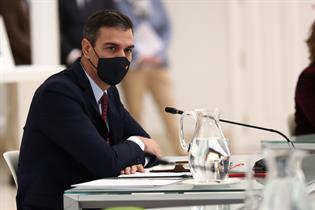Pedro Sánchez sets up Social Dialogue Board for Recovery, Transformation and Resilience with social stakeholders
President's News - 2020.11.16
Images of the meeting for the set up of the Social Dialogue Board for the Recovery, Transformation and Resilience, chaired by the President of the Government, Pedro SánchezPool Moncloa/Diego del Monte y Jorge Villar2020.11.16
Moncloa Palace, Madrid
Through this Dialogue Board, the government undertakes to maintain the social stakeholders informed of developments in negotiations of the Plan with the European Commission Task Force and of the final document prior to its formal presentation to Brussels, scheduled for the start of 2021.
The Board will also serve to keep the social stakeholders regularly informed of the implementation and monitoring of the Plan over the coming years.
The meeting to set up the Board was attended, in addition to the President of the Government, by the Third Vice-President of the Government and Minister for Economic Affairs and Digital Transformation, Nadia Calviño; the Fourth Vice-President of the Government and Minister for Ecological Transition and Demographic Challenge, Teresa Ribera; the Minister for the Treasury and Government Spokesperson, María Jesús Montero; the Minister for Education and Vocational Training, Isabel Celaá; the Minister for Work and Social Economy, Yolanda Díaz; the Minister for Industry, Trade and Tourism, Reyes Maroto, and the Minister for Inclusion, Social Security and Migration, José Luis Escrivá. The meeting was attended, on behalf of the social stakeholders, by the General Secretary of CCOO, Unai Sordo; the President of the CEOE, Antonio Garamendi; the General Secretary of UGT, Pepe Álvarez and the President of CEPYME, Gerardo Cuerva.
Government boosts public-private collaboration
 Pool Moncloa/Fernando CalvoThis meeting to set up the Social Dialogue Board also served to explain the Royal Decree-Law that the government is finalising, which incorporates measures to eliminate bottlenecks, reduce formalities, controls and unnecessary reports and to shorten administrative deadlines.
Pool Moncloa/Fernando CalvoThis meeting to set up the Social Dialogue Board also served to explain the Royal Decree-Law that the government is finalising, which incorporates measures to eliminate bottlenecks, reduce formalities, controls and unnecessary reports and to shorten administrative deadlines.
Specifically, the creation of a new figure is being finalised - that of Strategic Projects for the Economic Recovery and Transformation, to include such new instruments as public-private collaboration in the legal system. This figure will include projects of a strategic nature, with a potential knock-on effect for the rest of the economy, and which requires collaboration between different tiers of government, companies and research centres to ensure the scaling of operations in our country.
More social dialogue during the pandemic
The introduction of this Social Dialogue Board for the Recovery, Transformation and Resilience reflects the government's interest in the social stakeholders playing an important role in drawing up the Plan. This emphasis on dialogue has been a constant feature since the outbreak of the COVID-19 pandemic.
This can be seen in the negotiations of the Temporary Lay-off Plans (Spanish acronym: ERTEs), the signing of the Agreement for Economic Activation and Employment on 3 July, the decision to reactivate the existing social dialogue boards in March and the creation of a fifth "Coronavirus Board", along with the many meetings held with the social stakeholders to structure and monitor the different rafts of economic and social measures in response to the pandemic. The government's commitment to dialogue with the social stakeholders has led to the signing of six agreements to date: the rise in the minimum wage, three agreements to defend jobs (ERTEs and benefits for the self-employed), the Economic Reactivation and Employment Agreement and the Remote Working Agreement.
Modernise the labour market and productive structure
As well as addressing the main lines of the Recovery Plan, the government and the social stakeholders took the opportunity of the meeting to set up the Social Dialogue Board to address such key issues in the recovery process of the Spanish economy as the modernisation of the labour market and active employment policies to minimise the impact on jobs in future crises; the pact for industry that leads to the restructuring and modernisation of the productive economy; the boosting of digitalisation for workers and companies, and pushing through effective measures to reveal the black economy.
The Recovery Fund/Next Generation EU makes some 140 billion euros available to Spain over the next six years (2021-2026). The government wishes to speed up the implementation of the Plan over the first three years, to which end it can use the amount of the transfers under the Recovery and Resilience Facility - some 59.5 billion euros that will be paid out in 2021-2023. In order to bring forward its implementation, the government has charged 27 billion euros provided from the European funds to the 2021 Draft National Budget.
Non official translation





